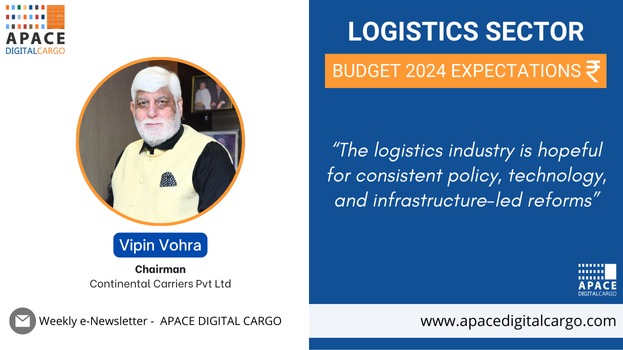
The Budget 2024, plays a vital role in fostering growth, encouraging innovation, and equipping the logistics industry to address future challenges and opportunities.
Apace Digital Cargo has gathered industry perspectives on the expectations for the logistics sector in Budget 2024.
Vipin Vohra, Chairman, Continental Carriers Pvt Ltd highlights key three expectations – seeking GST exemption for international freight services; to incentivise private players for establishing off-airport cargo handling locations; & freight charges to be rationalised and simplified to reduce overall logistics costs.
“The logistics industry is hopeful for consistent policy, technology, and infrastructure-led reforms”
As India eagerly anticipates the Union Budget 2024 announcement by Hon’ble Finance Minister Ms. Nirmala Sitharaman on 23rd July 2024, the logistics industry is hopeful for consistent policy, technology, and infrastructure-led reforms. The sector is set to be a crucial driver of growth as India aims to become a $7 trillion economy by 2030, supported by the National Logistics Policy and initiatives like PM Gati Shakti.
The logistics industry has several key expectations from the new budget. First, the industry seeks a permanent GST exemption for international freight services via air and ocean for export shipments, including ancillary services like customs clearance, warehousing, and cargo handling. Globally, GST is not charged on export shipments, and since it is eventually credited back to the exporter, the levy is considered unjustified.
Second, initiatives like PM Gati Shakti and ‘Make in India’ are expected to boost international cargo movement, leading to congestion at cargo terminals. The government should incentivize private players to establish off-airport cargo handling locations near airports and industrial belts to alleviate this issue.
Finally, the government should ensure that freight charges levied by airlines, shipping lines, and cargo terminal operators are rationalised and simplified to reduce overall logistics costs, as outlined in the National Logistics Policy.





